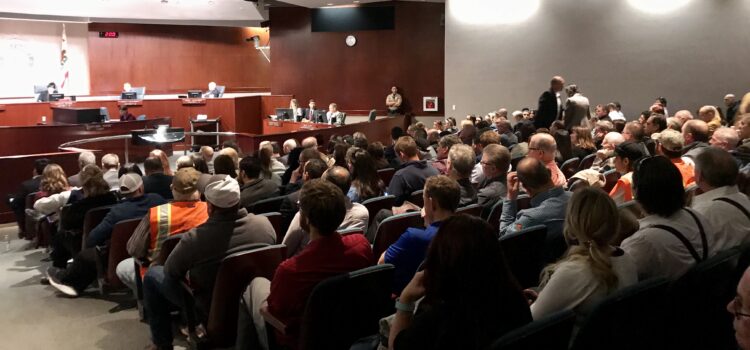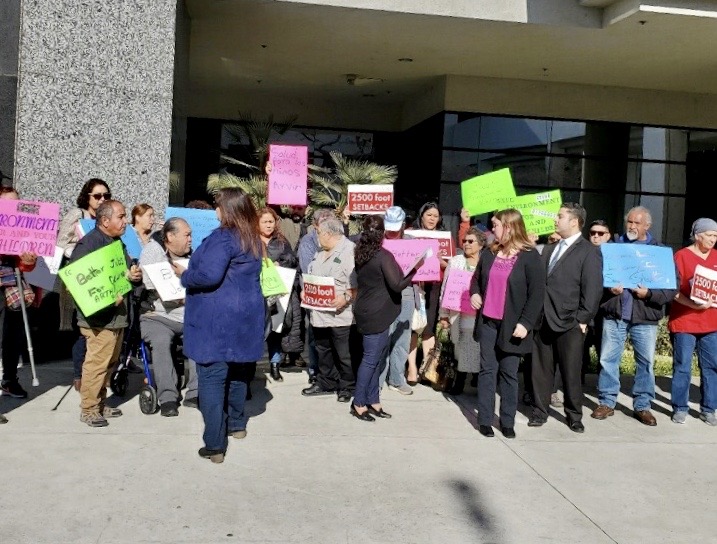
Hundreds of people joined State officials from Governor Gavin Newsom’s office Tuesday for a six-hour long Board of Supervisors meeting, where the Board discussed the economic impact State regulations regarding the oil and gas industry would have on Kern County.
Supporters of the oil and gas industry, elected officials, environmental justice advocates, education leaders and local law enforcement officers filled the Board of Supervisors chamber at 1 p.m. — an hour before the meeting was set to start — and people filled up overflow seating in the lobby and in the third floor of the Kern County Administrative Office.
“The only way we can realize a future for Kern County is by working together,” said Anthony Williams, a member of the governor’s senior staff.
The meeting was set in response to Newsom’s November announcement of a crackdown on fracking and a moratorium on new oil wells using high-pressure steam, the Sacramento Bee reports. Newsom’s office is also working with public health advocates to develop new oil and gas regulations for the state.
After a six hours of hearing comments from members of the community, the Board approved a motion to hire a consultant to conduct a study that would determine the economic impact of the Governor’s proposals. The Board also approved a referral to put together a group of key stakeholders to begin a dialogue with the Governor over the issue.
“I think an important thing for us to do is consider whether or not we’re going to declare an economic crisis here in Kern County as a result of these new moratoriums and regulations on oil,” Supervisor Zack Scrivner said.
Oil and gas industry representatives from Chevron, Area, and California Resources Corporation and many others from the industry spoke to the state representatives and the Board of the impact the regulations and the uncertainty will have on the community. They argued the cuts in the thousands of local jobs and millions of dollars in tax revenue will greatly hurt the local economy and families.
Within the last two year, Chevon has contributed $6 million to local nonprofit organizations, according to Jerry Tardivo, Chevron’s general manager of operations.
However, the local economy was just one of the concerns community members expressed.
Prior to the meeting, environmental justice advocates held a press conference in front of the administrative office to address the health impacts the oil and gas industry has had on the community.

“We are not against oil,” said Cesar Aguirre, a community organizer with Central California Environmental Justice Network. “What we want is to protect communities and that they have breathable air and live safely in their own neighborhood.”
Aguirre said it isn’t feasible to eliminate oil immediately; however, he said there needs to be a plan to transition away from the industry, “or else the families are going to be left like in 2015 — when there was a crisis.”
During the meeting after three and a half hours of hearing from oil and gas industry supporters, environmental justice advocates had 15 minutes to present on the health impacts. Supervisor Leticia Perez said they were given 15 minutes because the purpose of the meeting was to discuss the economic impact.
“Environmental justice is not only about environmental health,” said Ingrid Brostrom, the assistant director of the Center on Race, Poverty and the environment. “It is about economic justice as well. We care about the economic prosperity of Kern County.”
Brostrom said advocates have shared objectives with the oil and gas industry: a thriving and prosperous economy, safe jobs, and healthy places to live.
Although there are common objectives, she said the county needs to diversify because oilfield production in California continues to decrease.
Aguirre said diversifying can ensure Kern isn’t reliant on one resource to fuel the economy and help create new jobs in renewable energy
Genevieve Gale, a member of the Central Valley Air Quality Coalition, went more in depth of the health impacts. In her presentation, she said oil and gas contributes to the poor air quality in the Central Valley. Research has shown pollution is connected to respiratory diseases and heart attacks, according to Gale.
From 2013 to 2016, one in 37 people died of respiratory disease in Kern County alone, Gale said.
“The lengths and quality of our lives matter,” she said. “The capacity of our child’s lungs matter. The ability of my heart being able to beat matters to me.”
During the meeting, oil and gas supporters questioned why the State would rely on oil from forein countries, such as Saudi Arabia and Ecuador, instead of producing the resource in the United States. Seventy percent of the state’s oil comes from imports, according to Aera President and CEO Christina Sisturnk.
“It doesn’t make sense to ship a key source of California’s income and jobs to countries that don’t adhere to our safety, environmental and human rights standards,” she said.
Board members called Newsom’s regulations an “attack” on Kern County and the oil and gas industry, and they said they are prepared to fight back.
“I will ask my board to declare Kern County an oil and gas sanctuary county,” Maggard said.
Elected officials, such as Senator Shannon Grove, Senator Melissa Hurtado and Assembly member Vince Fong all spoke in support of the oil and gas industry.
District Attorney Cynthia Zimmer said the decrease in oil prices is linked to the loss of 43 prosecutors who took jobs in other countries that offered higher wages. She also credited the industry to giving formerly incarcerated individuals a “second chance” by providing well-paying jobs.
California officials have set a goal to have the state be carbon neutral by 2045 as a way to be a global leader when it comes to addressing climate change.
Aguirre said, “If Kern County is not ready to move forward with the rest of the state, then Kern County is going to be left behind.”